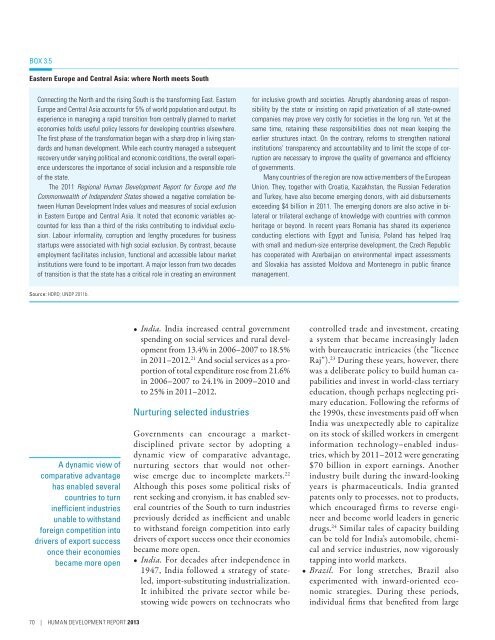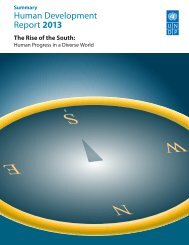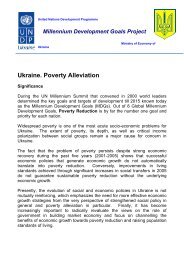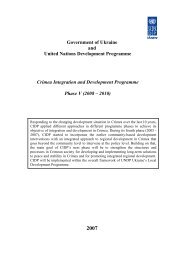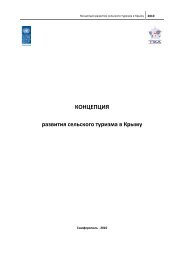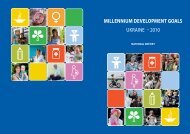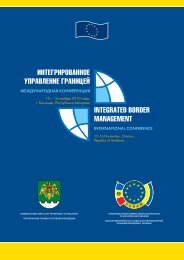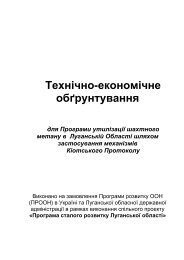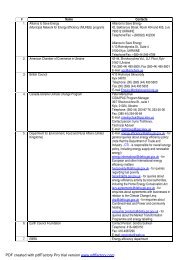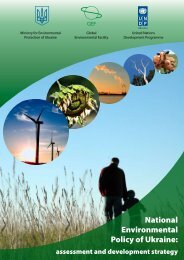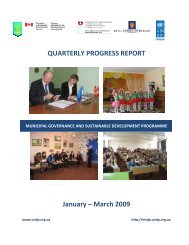E N S W - United Nations Development Programme
E N S W - United Nations Development Programme
E N S W - United Nations Development Programme
Create successful ePaper yourself
Turn your PDF publications into a flip-book with our unique Google optimized e-Paper software.
Box 3.5<br />
Eastern Europe and Central Asia: where North meets South<br />
Connecting the North and the rising South is the transforming East. Eastern<br />
Europe and Central Asia accounts for 5% of world population and output. Its<br />
experience in managing a rapid transition from centrally planned to market<br />
economies holds useful policy lessons for developing countries elsewhere.<br />
The first phase of the transformation began with a sharp drop in living standards<br />
and human development. While each country managed a subsequent<br />
recovery under varying political and economic conditions, the overall experience<br />
underscores the importance of social inclusion and a responsible role<br />
of the state.<br />
The 2011 Regional Human <strong>Development</strong> Report for Europe and the<br />
Commonwealth of Independent States showed a negative correlation between<br />
Human <strong>Development</strong> Index values and measures of social exclusion<br />
in Eastern Europe and Central Asia. It noted that economic variables accounted<br />
for less than a third of the risks contributing to individual exclusion.<br />
Labour informality, corruption and lengthy procedures for business<br />
startups were associated with high social exclusion. By contrast, because<br />
employment facilitates inclusion, functional and accessible labour market<br />
institutions were found to be important. A major lesson from two decades<br />
of transition is that the state has a critical role in creating an environment<br />
for inclusive growth and societies. Abruptly abandoning areas of responsibility<br />
by the state or insisting on rapid privatization of all state-owned<br />
companies may prove very costly for societies in the long run. Yet at the<br />
same time, retaining these responsibilities does not mean keeping the<br />
earlier structures intact. On the contrary, reforms to strengthen national<br />
institutions’ transparency and accountability and to limit the scope of corruption<br />
are necessary to improve the quality of governance and efficiency<br />
of governments.<br />
Many countries of the region are now active members of the European<br />
Union. They, together with Croatia, Kazakhstan, the Russian Federation<br />
and Turkey, have also become emerging donors, with aid disbursements<br />
exceeding $4 billion in 2011. The emerging donors are also active in bilateral<br />
or trilateral exchange of knowledge with countries with common<br />
heritage or beyond. In recent years Romania has shared its experience<br />
conducting elections with Egypt and Tunisia, Poland has helped Iraq<br />
with small and medium- size enterprise development, the Czech Republic<br />
has cooperated with Azerbaijan on environmental impact assessments<br />
and Slovakia has assisted Moldova and Montenegro in public finance<br />
management.<br />
Source: HDRO; UNDP 2011b.<br />
A dynamic view of<br />
comparative advantage<br />
has enabled several<br />
countries to turn<br />
inefficient industries<br />
unable to withstand<br />
foreign competition into<br />
drivers of export success<br />
once their economies<br />
became more open<br />
• India. India increased central government<br />
spending on social services and rural development<br />
from 13.4% in 2006–2007 to 18.5%<br />
in 2011–2012. 21 And social services as a proportion<br />
of total expenditure rose from 21.6%<br />
in 2006–2007 to 24.1% in 2009–2010 and<br />
to 25% in 2011–2012.<br />
Nurturing selected industries<br />
Governments can encourage a marketdisciplined<br />
private sector by adopting a<br />
dynamic view of comparative advantage,<br />
nurturing sectors that would not otherwise<br />
emerge due to incomplete markets. 22<br />
Although this poses some political risks of<br />
rent seeking and cronyism, it has enabled several<br />
countries of the South to turn industries<br />
previously derided as inefficient and unable<br />
to withstand foreign competition into early<br />
drivers of export success once their economies<br />
became more open.<br />
• India. For decades after independence in<br />
1947, India followed a strategy of stateled,<br />
import-substituting industrialization.<br />
It inhibited the private sector while bestowing<br />
wide powers on technocrats who<br />
controlled trade and investment, creating<br />
a system that became increasingly laden<br />
with bureaucratic intricacies (the “licence<br />
Raj”). 23 During these years, however, there<br />
was a deliberate policy to build human capabilities<br />
and invest in world-class tertiary<br />
education, though perhaps neglecting primary<br />
education. Following the reforms of<br />
the 1990s, these investments paid off when<br />
India was unexpectedly able to capitalize<br />
on its stock of skilled workers in emergent<br />
information technology–enabled industries,<br />
which by 2011–2012 were generating<br />
$70 billion in export earnings. Another<br />
industry built during the inward-looking<br />
years is pharmaceuticals. India granted<br />
patents only to processes, not to products,<br />
which encouraged firms to reverse engineer<br />
and become world leaders in generic<br />
drugs. 24 Similar tales of capacity building<br />
can be told for India’s automobile, chemical<br />
and service industries, now vigorously<br />
tapping into world markets.<br />
• Brazil. For long stretches, Brazil also<br />
experimented with inward-oriented economic<br />
strategies. During these periods,<br />
individual firms that benefited from large<br />
70 | HUMAN DevELOPMENT REPORT 2013


